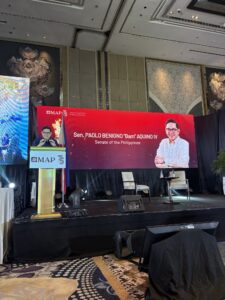By Brontë H. Lacsamana, Reporter
AN UNFINISHED production titled Moudifa the Musical is serving as the proof of concept for artificial intelligence (AI)-generated music and lyrics, created by its executive producer, entrepreneur and budding writer-composer Margarita Marquis.
At a preview of the musical on Nov. 4, held at the RJ Bistro in Makati’s Dusit Thani Hotel, BusinessWorld saw some of the work-in-progress material, helmed by TV director Jag Cruz.
The title of the musical, Moudifa, refers to the Arabic word for servicewoman — in aviation, a flight attendant. The musical follows a Filipina working in the Middle East, a novel, Moudifa!: Culture Shock from the Top, which was inspired by Ms. Marquis’ real-life story, published in 2007.
Ms. Marquis told the press that they need producers for her vision to come to life — and that vision is to be “the next Miss Saigon.”
Aside from advocating for the empowerment of women and overseas Filipino workers, proceeds of the show will go to the Mother and Child Foundation, which she also heads.
“[To be like] Miss Saigon, we need a lot of money,” she explained. “There’s a purpose, there’s advocacy, so it should be done.”
One thing she was proud to say about the musical is that she wrote all the music and lyrics herself — with the aid of AI.
“At the beginning, a hundred songs I created with AI. I said, ‘Okay, I will use AI, no soul,’ kasi sabi nilang lahat walang soul daw, diba (because everyone says that it has no soul, right)? So I created [it] like this. And then, at 3 o’clock in the morning, pwede na (it was okay),” she said, when we asked what her creative process was.
“After 50 songs, AI was following my feelings, my soul! I said, ‘Okay, AI, can you cry?’ AI can cry!” Ms. Marquis explained at the press conference. “Did you hear the lyrics? It is not AI. It is from my soul.”
A REVIEW OF THE SONGSWhile the musical is still in development, with the producers in the process of seeking funding for a full production to be staged in 2026, potential patrons and select members of the press got to see 14 musical numbers in total at RJ Bistro.
The songs were pre-recorded tracks sung, or at times lip-synched, by the production’s performers (the lead character of Moudifa is played by VIVA artist Jassy Calupitan and RJ & The New Riots vocalist Angie Bonnevie). They had only been rehearsing for a week at that point.
The ensemble performances were danced by the Next Us Dance Crew, who didn’t lack in passion and energy.
The first song, “Moudifa’s Flight,” began with oddly verbose lyrics set to a generic pop sound (think Lady Gaga if she stopped trying) — already a hint that it was created with the assistance of AI.
It starts off with “In a land where the sand meets the golden oil, Moudifa’s on a mission, through the sweat and toil.” The chorus goes, “Ooh, Moudifa, your spirit soars / In the land of petrol dollars, you open the doors / Stronger than the laws that try to control / In your wings of freedom, you’re finding your soul.”
The succeeding songs were surprisingly polished as well, blending genres with ease. A more upbeat pop track, “Boom Boom Boom,” has the younger Moudifa actress move with the dance crew, while the Tagalog-language “Lumipad ng Mataas” provides a cute anthem for her dreams.
The songs by the love interests in Moudifa’s story come off as particularly juvenile. “Dance Dance Dance” has the character of The Football Player hype up the crowd with a P-pop dance tune while “Prince of Dreams” has The Prince represent idealized affection in the form of a somewhat-Arabian-inspired Ed Sheeran-esque acoustic ballad.
(Strangely The Prince sings about himself from the perspective of Moudifa: “Oh, the young prince from the Arabian night / With the grace of the dawn and a charm that’s so bright / Never thought I’d see him, he slipped through my hands / But the girl in me dreams of faraway lands.”)
The fact that they had 14 songs ready for the preview — many of which the actors and actresses could barely sing with conviction because of how chunky the lyrics were — piqued this writer’s suspicion that AI was used. So I asked and Ms. Marquis answered in the affirmative.
ON USING AI IN MUSICAL THEATERMs. Marquis, as executive producer and writer, was open about using AI for her creative process.
“You know how I created the songs, how many? Hundreds. Hundreds of songs. Hundreds from my heart,” she said at the press conference.
The keyword here is created — even when BusinessWorld asked about how she wrote the songs, she corrected us by saying “created.”
She specified that her process was “modern, with AI, the future of music.”
The audience was stunned when she went on, in front of the very singers she hired for the showcase: “Mawawala lahat ng mga singers (All the singers will be gone), I’m sorry. AI will take over. That is for sure.”
The amalgamation of genres displayed was described by Ms. Marquis as a mixture of “Lady Gaga, Arabic, and pop.”
Asked to react to the idea of using AI in this way, playwright and librettist Luna Griño-Inocian (The Lion, the Witch, and the Wardrobe, The Horse and His Boy, and The Quest for the Adarna) said that AI ultimately “gets emotions and feelings from somebody else,” using original work by other artists as a template.
“When your ideas are posted online, they get eaten up and used. You may think it’s your feelings, but AI gets its ideas from human beings,” she explained. “You can spot if a song sounds a lot like something else because AI eats it up and throws it back at you. You can recognize it with certain repeat patterns.”
Aside from the uncanny verbosity, one noticeable pattern in Moudifa is the opening lyrics of many songs: “In the heart of Manila where the night comes alive / Ermita’s glow, where the dreamers strive,” then “In a world where the colors shine bright / I wear my uniform and I’m ready for flight,” and “In a desert palace under a mystic moon / A young prince sings a forgotten tune.” All display similar sentence structures.
Composer and scorer Vincent De Jesus (Care Divas, Himala: Isang Musikal, Kung Paano Ako Naging Leading Lady, Batang Rizal, Zsazsa Zaturnnah Ze Muzikal) told BusinessWorld in a video call that it really shows when something is “just pixels and stolen information all put together.
“Any composer or artist would agree that AI has no place in the arts, in musical theater, because why would you pay P2,000 for a ticket when you can just generate your own musical using prompts at home?” he said.
Composer and musical director Ejay Yatco (Pingkian: Isang Musikal) weighed in with a message sent on Facebook: “I personally am against the use of AI to write music. The most I can see it being used for is as a brainstorming tool.
“The point of art is to provide a human perspective on things, to tell stories as humans,” he said. “The AI being an algorithm is an impressive tool, but it will never be able to replicate a true human perspective.”
Not every artist approached by BusinessWorld was so negative about the use of AI. Musician and composer Myke Salomon (Bar Boys: A New Musical) told BusinessWorld in a Zoom call that the Moudifa production shouldn’t be crucified for their AI use.
“When I started out, I had the computer to help me read and write notes and compose,” he explained. “I understand her need for a tool, but it still boils down to whether you can use it to communicate your story and translate it into an immersive experience and a transformative show.”
He added that to Ms. Marquis’ claims of an AI future where performers will be obsolete, they can be protected by a musicians’ equity, such as when unions on Broadway protested over Here Lies Love using only a DJ and canned music, and no live musicians.
For Mr. De Jesus, the Filipino theater community can be just as vigilant, expressing confidence that if a company were to open and mount shows fueled by AI, “the industry and the audiences will not stay silent.”
“Coming from the pandemic, we’ve only just begun reaping the fruits of our labor,” he said. “Starting 2023, left and right we’ve had so many original plays, musicals, student productions. At the end of the day, the audience will be the judge.”






